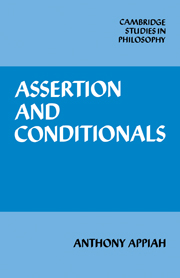Book contents
- Frontmatter
- Contents
- Acknowledgements
- Notation
- 1 Cartesianism, behaviourism and the philosophical context
- Part I Belief
- Part II Meaning
- Part III Conditionals
- 8 Indicative conditionals
- 9 Truth and triviality
- 10 Logic without truth
- 11 Generalising the probabilistic semantics of conditionals
- Epilogue
- Bibliography
- Index of names
- Index of key terms
8 - Indicative conditionals
Published online by Cambridge University Press: 07 October 2011
- Frontmatter
- Contents
- Acknowledgements
- Notation
- 1 Cartesianism, behaviourism and the philosophical context
- Part I Belief
- Part II Meaning
- Part III Conditionals
- 8 Indicative conditionals
- 9 Truth and triviality
- 10 Logic without truth
- 11 Generalising the probabilistic semantics of conditionals
- Epilogue
- Bibliography
- Index of names
- Index of key terms
Summary
Hastings: If they have done this deed, my noble lord, –
GLOUCESTER: If! thou protector of this damned strumpet. Talks't thou to me of ‘if's? Thou art a traitor: – Off with his head!
(Richard III Art III, scene iv)SUBJUNCTIVE AND INDICATIVE CONDITIONALS
‘If's and ‘iff's abound in philosophical analysis, but the philosophical analysis of ‘if's and ‘iff's is a highly controversial matter. Still, I believe that, at least for some conditionals, the problem of analysis is now approaching a solution. In the next four chapters I say what I think that solution is for one class of conditional, the class that is usually called indicative.
That there are more conditionals in English than these is, I think, plain enough. In 3.3 I gave my main reason for thinking this: I suggested that there were two distinct jobs to be done by conditional beliefs, the states most naturally expressed in English by sentences beginning with ‘if’. One job, that of the other major class, the subjunctive conditionals, was in deciding what to do, which shows up in the theory as computing expected utility. The other job, that of the indicatives, was in changing our minds, which shows up in the theory as conditionalisation. That these two jobs must be done by different beliefs follows from the existence of the class of Newcomb problems that led to the reformulation of decision theory in its causal version.
- Type
- Chapter
- Information
- Assertion and Conditionals , pp. 161 - 191Publisher: Cambridge University PressPrint publication year: 1985



